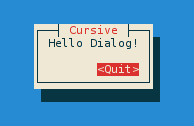| assets | ||
| doc | ||
| examples | ||
| src | ||
| .gitignore | ||
| .travis.yml | ||
| Cargo.toml | ||
| LICENSE | ||
| Readme.md | ||
Cursive
Cursive is a ncurses-based TUI (Text User Interface) library for rust. It is based on jeaye's ncurses-rs.
It is designed to be safe and easy to use:
[dependencies.cursive]
git = "https://github.com/Gyscos/cursive"
(You will also need ncurses installed - if it isn't already, check in your package manager.)
extern crate cursive;
use cursive::Cursive;
use cursive::view::{Dialog,TextView};
fn main() {
// Creates the cursive root - required for every application.
let mut siv = Cursive::new();
// Create a popup window with a button that quits the application
siv.add_layer(Dialog::new(TextView::new("Hello Dialog!"))
.title("Cursive")
.button("Quit", |s| s.quit()));
// Starts the event loop.
siv.run();
}
(Colors may depend on your terminal configuration.)
The goal is to be flexible enough, so that recreating these kind of tools would be - relatively - easy (at least on the layout front):
A few notes :
- The main focus point is not performance. This is a simple layout library, guys, not compiz piped into libcaca. Unless you are running it on your microwave's microcontroller, it's not going to be slow.
- The library is single-threaded. Thus, callback methods are blocking - careful what you're doing in there! Feel free to use threads on your side, though.
- This goal is not to have an equivalent to every ncurses function. You can access the underlying ncurses window when creating your own custom views, so you can do what you want with that, but the main library will probably only use a subset of the ncurses features.
Compatibility
First off, terminals are messy. A small set of features is standard, but beyond that, almost every terminal has its own implementation.
I mostly test VTE-based terminals (Gnome & Xfce), with the occasional Konsole and xterm checks.
Output
- Colors: the basic 8-colors palette should be broadly supported. User-defined colors is not supported in the raw linux TTY, but should work in most terminals, although it's still kinda experimental.
- UTF-8: Currently Cursive really expects a UTF-8 locale. It may eventually get patched to support window borders on other locales, but it's not a priority. Also, Cursive currently expects every codepoint to be a one-column character, so some things may break with exotic characters...
Input
The key_codes example can be a useful tool to see how the library reacts to various key presses.
- Basic set: All simple key press (without shift, alt or ctrl pressed) should work in all terminals.
- Shift+keypress: All characters keys (letters, numbers and punctuation) should work as expected.
- UTF-8: UTF-8 input should work fine in a unicode-enabled terminal emulator, but raw linux TTY may be more capricious.
- Control codes:
Contribute
You want to help? Great! Here is a non-exhaustive list of things you could do:
- Provide example use-case: a good idea of application for existing or new components.
- Test and reports issues: a bug won't get fixed if we don't know it's there.
- Hack the code! If you feel confident with rust, pick an issue you like and hack away!
